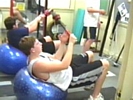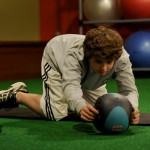THE Most Important Hockey Season Is Coming Up?
I’m hoping my hockey friends noticed the “THE” in my title, because I truly meant to type it that way. Yes, I feel that in the overall picture of being a hockey coach or hockey dad — or even if I was an adult rec player, the coming days, weeks and months are as important as any in the entire year! In a way, what we do over that span is going to determine how we (or our player/s) will perform next fall.
Oh, by the way… It’s very possible that I’ll leave this particular article available to the general public. In a small way, perhaps, I’m at least alerting as many hockey people as possible as to the importance of the coming weeks. As always, though, I’ll save the meaty stuff — or my exact recommendations — for my members only.
I’ve covered this topic — in depth and in many ways — elsewhere within CoachChic.com. To save you the time in chasing one important view of the spring months, however, let me at least outline the way most advanced level organizations and trainers break down an entire year…
- In-season – your regular playing season
- Post-season – the period immediately following the playing season
- Off-season – something like the middle of that time away from your regular season
- Pre-season – the weeks leading into your regular playing season

We all (including yours truly) tend to paint the entire time away from our regular schedule as the “off-season”. However, advanced level hockey types know that each of those four separate parts of our year should be treated very, very differently.
There should be little doubt that most amateur leagues have completed their regular seasons by now, and we’re currently in what the above shows as our “Post-season”.
Okay, so why is it I suggested we’re now into “THE Most Important” hockey season? Well, in a nutshell, it’s because I see it as our one chance to make corrections in what we’re doing, so we can get it even closer to right by next fall!
If you’re a hockey coach, I’ll suggest the first thing you do is perform some really serious soul-searching…
How about communication? Did the team (or team parents) conform to set team rules? Could those rules need expanding upon, or some slight altering or updating? Dealing with the players, might there be better ways to get our idea across — say, with added media or teaching tools?
And, how about the way your team came along… Even after coaching all the years I have, I know I’ve already recognized a few areas of play that could have been treated differently. (Yes, even I constantly re-evaluate my coaching, mainly because I intend to keep getting better and better at what I do.)
If you’re a hockey parent — and you truly want your youngster to enter the next season even better than the last, I’ll suggest the following…

Be honest in an evaluation of his or her weaknesses. If the player is old enough, see if he or she agrees with what you’re saying, and if he or she is willing to do a little work to overcome those shortcomings.
Also be honest in seeking your youngster’s strengths (or more likely, a main strength). That could be speed, aggressiveness, size, puckhandling, shooting, whatever. For, as I’ve written elsewhere here, future coaches (and even scouts) most often get attracted by strengths before they start to look for weaknesses. So, for example, if a player has a hard shot, it probably wouldn’t hurt that his or her shot be brought to the point of being absolutely frightening to opposition goalies.
I honestly believe adult rec players could do a similar self evaluation… I don’t know if dwelling on a strength would be my main priority but, I wouldn’t discount it. Mostly, though, I notice that a great many recreational skaters would benefit lots by eliminating their weaknesses. Ya, you’ve got to “accentuate the positive”, as the old song goes.
Those who know me probably realize how much I value time — as in the amount of time I have to accomplish a given task. So, just take a look at the coming Post-, Off-, and Pre- seasons through my eyes for a sec, and appreciate that we now have the luxury of quite a few months to ready for next fall. Yup, count ‘em: May, June, July and August, IF we don’t piddle that precious time away!
Oh, by the way… I can almost bet that half the non-members reading this are going to revert to what they’ve always done — like chasing tournaments all over the countryside, attending the most popular hockey school, or enrolling for the usual spring and/or summer league. Oh, one of those might not kill a player, but I doubt any of them will help solve the things you consider as playing weaknesses or strengths. In fact, if one keeps doing what he or she has always done in the past, it’s very doubtful any significant results can be achieved.
All the above gives you a hint of what I have in store (for members) over the coming months. A lot of it is going to involve ideas for off-ice training (and training at home), because I’ve found that these types of overlapping activities not only help a player’s hockey game, but they also expand his or her physical — and even mental — abilities quite a bit. That said, I promise that I’ll still be adding some on-ice ideas to help all my friends reach their goals for when the puck drops again in earnest next fall.
Then, this final tip… Most elite level programs and instructors (as well as wise hockey parents) know that a player takes quite a physical and mental pounding over a long winter In-season. So, while those in the know never allow those in their charge to suddenly become couch potatoes, they do back-off on the heavy training for a short time. In elite circles, the kind of physical stuff done during this period is known as “passive activity”. And, in my mind, this is the one time during an entire year when — if things are done right — a player’s love of the game can be greatly renewed. Tournaments, camps and off-season leagues don’t do that, but I’ll be telling you soon just what will.